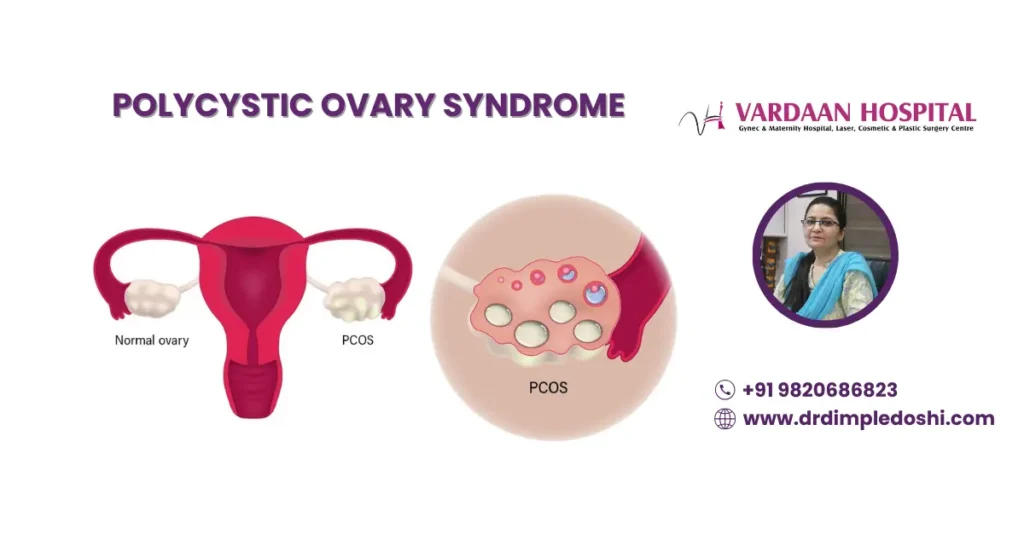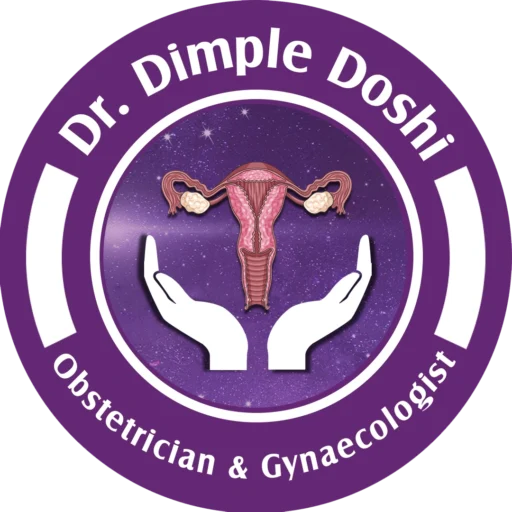Understanding PCOS and PCOD

What is PCOS?
Polycystic Ovarian Syndrome (PCOS) is a condition where one or both ovaries develop multiple small fluid-filled cysts. These cysts prevent the ovaries from releasing eggs regularly, leading to hormonal imbalances. The excess production of male hormones disrupts the body’s normal hormonal system, causing a range of symptoms.
According to the Federation of Obstetric and Gynecological Societies of India (FOGSI), about 20-30% of women suffer from PCOS.
Symptoms of PCOS
Symptoms may include:
- Excess facial hair growth
- Scalp hair thinning
- Acne
- Obesity
- Dark skin patches (Acanthosis Nigricans)
- Menstrual irregularities
- Difficulty in conceiving
How are PCOS and PCOD different?
Although often confused, PCOS and PCOD differ in causes, severity, and health impacts. Understanding these differences is crucial for proper diagnosis and treatment.
Feature | PCOD | PCOS |
Cause | Hormonal imbalance | Disruption of the entire hormonal system |
Impact | Affects menstruation | Also Affects blood pressure, sugar regulation, and metabolism |
Severity | Milder | More severe and resistant to treatment |
Ovary Size | Normal to slightly enlarged | 3 times larger than normal |
Causes | Stress, obesity, genetics, poor diet | Genetic, insulin resistance, inflammation |
Prevalence | Common (affects up to 1/3rd of women) | Less common |
Symptoms | Acne, hair loss, weight gain | Male-pattern baldness, Facial Hirsutism, mood swings, headaches, infertility |
Pregnancy | Possible with lifestyle changes & medication | Difficult due to high androgen levels, Requiring IVF |
Complications | Minimal | High risk of diabetes, hypertension, obesity, cardiovascular diseases, Endometrial Cancer |
What are the causes of PCOS?
PCOS can be triggered by both genetic and environmental factors like obesity, poor diet, and chemical exposure, making lifestyle a key component in prevention.
1. Environmental Factors
- Obesity and sedentary lifestyle
- Exposure to industrial chemicals (e.g., Bisphenol A)
- Poor dietary habits
2. Genetic Factors
- Family history of PCOS
- Faulty genes related to insulin resistance
How is PCOS diagnosed?
Diagnosing PCOS involves assessing symptoms, hormone levels, ultrasound findings, and sometimes even mental health and sleep studies to confirm the condition.
- Irregular menstrual cycles (due to failed ovulation)
- High levels of male hormones (leading to facial hair, scalp hair thinning, and acne)
- Multiple cysts in ovaries detected via ultrasound
Diagnostic Steps:
- Medical History: Assessment of menstrual cycles and associated symptoms.
- Physical Examination: Inspection of reproductive organs, hair growth, and pigmentation.
- Ultrasound: Checks the ovaries and uterine lining.
- Blood Tests: Hormone levels (FSH, LH, Testosterone, Insulin, DHEAS), glucose tolerance, and lipid levels.
- Mental Health Assessment: Screening for anxiety and depression.
Sleep Study: Detecting conditions like obstructive sleep apnea.
What are the treatment options for PCOS?
PCOS treatment includes lifestyle changes, medication, and surgery. A tailored approach helps manage symptoms and improve fertility and hormone balance.
1. Lifestyle Modifications
- Weight Loss: Reducing 5-10% of body weight can improve insulin resistance by 50%.
- Healthy Diet: Avoid sugary foods, refined carbs, and high-GI foods.
- Regular Exercise: Brisk walking, jogging, swimming, and cycling help regulate blood sugar levels.
- Sleep Regulation: Poor sleep quality increases insulin resistance and obesity risk.
- Quitting Smoking & Alcohol: Reducing toxins can improve hormonal balance.
2. Medications
- Hormonal Pills: Help regulate menstrual cycles but may cause weight gain.
- Metformin: Originally an anti-diabetic drug, it improves insulin resistance and aids weight loss.
- Spironolactone: An anti-androgen that reduces excess hair growth, pigmentation, and acne.
- Vitamin D3, Myo & Chiro Inositol Supplements: Recommended for hormone regulation.
- Fertility Treatment: Ovulation-inducing medications like Clomiphene or Letrozole may be prescribed.
3. Surgical Treatments
- Ovarian Drilling (Laparoscopic Surgery): Recommended for women who fail to conceive through medication alone.
What should PCOS patients eat and avoid?
A PCOS-friendly diet focuses on fiber-rich whole foods and avoiding refined carbs, sugars, and processed items to manage symptoms and improve insulin sensitivity.
Foods to Eat
- Fruits & Vegetables: Rich in fiber and antioxidants.
- Whole Grains: Oats, quinoa, brown rice, wheat.
- Protein: Pulses, tofu, chickpeas, lentils.
- Healthy Fats: Nuts, seeds, olive oil, avocado.
- Lean Meat & Fish: Skinless poultry, salmon, tuna.
Foods to Avoid
- Refined Carbs: White bread, pasta, pizza, sugary cereals.
- Sugary Drinks: Aerated beverages, bottled smoothies, packaged juices.
- Processed Foods: Cakes, cookies, fast food, artificial cheese.
- Saturated & Trans Fats: Red meat, French fries, doughnuts.
- Alcohol & Sugary Cocktails: Increase insulin resistance.
What are the best exercises for PCOS management?
Regular physical activity like cardio, strength training, and yoga helps reduce insulin resistance, manage weight, and regulate hormone levels in PCOS.
- Cardio Workouts: Brisk walking, jogging, swimming.
- Strength Training: Helps improve metabolism.
- Yoga & Meditation: Reduces stress and balances hormones.
What are the long-term effects of PCOS?
Untreated PCOS may lead to serious health issues including diabetes, heart problems, cancer risk, and psychological challenges like depression and anxiety.
- Endometrial hyperplasia (thickening of the uterine lining)
- Increased risk of endometrial cancer
- Diabetes & high blood pressure
- Depression & anxiety
- Cardiovascular diseases
- Cholestrol
- Stroke & obesity-related complications
Who is the best doctor for the treatment of PCOS?
The best doctor for PCOS offers expert knowledge, empathy, and holistic care. In Mumbai, Dr. Dimple Doshi stands out for her specialized PCOS treatment.
When it comes to managing PCOS effectively, choosing the right doctor is crucial. The ideal specialist should not only understand hormonal imbalances but also guide you through lifestyle changes, mental health challenges, and fertility concerns.
In Mumbai, Dr. Dimple Doshi at Vardaan Hospital, Goregaon, is highly recommended for PCOS treatment due to:
- Specialization in PCOS and hormonal disorders
- Personalized treatment plans tailored to individual needs
- Integration of modern medicine with holistic wellness practices
- Warm and compassionate patient care approach
- High patient satisfaction and positive outcomes
Which is the best Hospital for PCOS treatment in Goregaon Mumbai?
Vardaan Hospital offers expert, compassionate, and comprehensive PCOS care backed by modern technology, holistic support, and experienced specialists & is a trusted name in women’s health—especially for the diagnosis and management of PCOS. It stands out for offering end-to-end care under one roof. Here’s why you should consider Vardaan Hospital:
- Expert Leadership: Guided by renowned gynecologist Dr. Dimple Doshi, known for her PCOS expertise.
- Comprehensive Services: From gynecology, all aspects of PCOS care are covered.
- Modern Infrastructure: Equipped with advanced diagnostic tools and minimally invasive surgical facilities.
- Friendly & Supportive Environment: Women feel comfortable, heard, and empowered throughout their treatment journey.
- Affordable & Transparent Pricing: Quality care that is accessible without financial stress.
- Multidisciplinary Team: Collaboration between specialists ensures better outcomes and continuity of care.
Vardaan Hospital isn’t just a treatment center—it’s a support system for women navigating PCOS and its long-term effects.
What are the key takeaways to manage PCOS effectively?
Managing PCOS involves consistent effort with diet, exercise, and medical advice. These steps help regulate hormones and improve long-term health outcomes.
- Maintain a healthy weight to control insulin and androgen levels.
- Follow a low-glycemic diet to regulate blood sugar.
- Stay active and establish a consistent daily routine.
If you’re struggling with PCOS, consult Dr. Dimple Doshi at Vardaan Hospital, Mumbai, for expert advice and personalized treatment.

